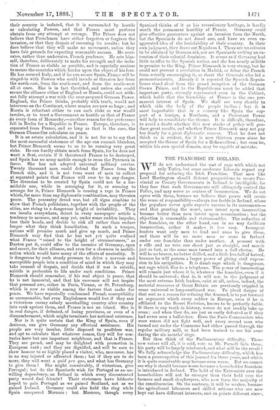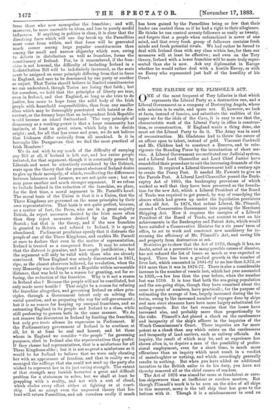THE FRANCHISE IN IRELAND.
WE do not understand the sort of rage with which not only Tories, but some moderate Liberals regard any proposal for reducing the Irish Franchise. That men like
Lord llartington should distrust propositions to create Pro- vincial or County Governments in Ireland is intelligible, for they fear that such Governments will ultimately control the Police, and may serve as centres of • insurrection. We do not agree with them, because we believe that power will create the sense of responsibility—always too feeble in Ireland, where the populace never quite expects success in its movements— and that granting the worst, men intent upon insurrection
become better than men intent upon assassination ; but the objection is reasonable and statesmanlike. The reduction of the franchise, on the other hand, can in no way facilitate insurrection, rather it makes it less easy. Insurgent leaders want only men to lead and arms to give them, and there will be no more men or arms in Ireland under one franchise than under another. A peasant with a rifle and no vote can shoot just as straight, and march just as fast, as the same man turned into a full elector. He will be no braver, no better drilled, and a little less full of hatred, because he will possess a larger power of giving civil expres- sion to his antipathies. It is dumb rage which is dangerous, not rage which flies to a telephone. The /river of insurrection will remain just where it is, whatever the franchise, even if it should be universal ; that is, it will not, in the judgment of the most extreme Irish leaders, exist at all, unless, indeed, the material resources of Great Britain are previously crippled in some universal or long-continued war. To plead danger of that sort as a reason for refusing the demand, is to put forward an argument which every soldier in Europe, even if he is affiliated to the Secret Societies, knows to be perfectly futile. If there is any truth in history, voters do not readily take up arms ; and when they do, are just as easily defeated as if they had never seen a ballot-box. Even the Paris Communists who were voters did not fight well, and every second man who turned out under the Commune had either passed through the regular military mill, or had been trained to use his arms during the six months' siege.
But then think of the Parliamentary difficulty. These new voters will all, it is said, vote as Mr. Parnell bids them, his party will he largely reinforced, and what will be the result ? We fully acknowledge the Parliamentary difficulty, which has been a preoccupation of this journal for three years, and which it is quite conceivable may become even worse. But we cannot see why it should become worse because a householder franchise is introduced in Ireland. The hold of the Extremists over the householders will not be stronger than their hold over the farmers and small shopkeepers, who now form the majority of the constituencies. On the contrary, it will be weaker, because the agricultural labourers and skilled artisans who are now kept out have different interests, and on points different view., from those who now monopolise the franchise ; and will, moreover, be more amenable to ideas, and less to purely sordid
influences. If anything in politics is clear, it is clear that the dissolving force which will one day break up the Parnellites must come from within, and that force will be generated much sooner among large popular constituencies than among the small and narrow oligarchy which now, owing to defects in distribution as well as franchise, forms the constituency of Ireland. For, be it remembered, if the fran- chise is not lowered, the difficulty of including Ireland in a Redistribution Bill will be indefinitely increased, as the seats must be assigned on some principle differing from that in force in England, and sure to be denounced by one party or another as unjust. That Tories should believe in limited constituencies we can understand, though Tories are losing that faith ; but for ourselves, we hold that the principles of liberty are true, even in Ireland, and that England, so long as she tries to do justice, has more to hope from the solid body of the Irish people with household responsibilities, than from any smaller class which may be thoroughly penetrated with hatred or dis- content, or the dreamy hope that an independent Irish Republic would become an island Switzerland. The very principle of democracy as a working-power is that a large community has instincts, at least in great crises, which help it to decide aright ; and, for all that has come and gone, we do not believe that Irishmen differ radically from all mankind. Is it in boroughs like Dungarvan that we find the most practical of Irish Members ?
We do not wish to say much of the difficulty of carrying any Bill at all, if 'Ireland is left out, and her entire people irritated, for that argument, though it is constantly pressed by Liberals and must be attentively considered by the Cabinet, rests upon the theory that the present electors of Ireland desire to give up their monopoly, of which, recollecting the differences between labourers and farmers, we are not quite sure ; but we may press another and much stronger argument. If we refuse to include Ireland in the reduction of the franchise, we place, for the first time, a moral argument in Mr. Parnell's hand. The moral basis of the Union is that it is a Union, that the Three Kingdoms are governed on the same principles by their own representatives. That basis is not quite perfect, because, as a matter of fact, the Peers, who are in a great majority British, do reject measures desired by the Irish more often than they reject measures desired by the English or Scotch ; but that is the theory, and if the new franchise is granted to Britain and refused to Ireland, it is openly abandoned. Parliament proclaims openly that it distrusts the people of one of the Three Kingdoms, and enables Mr. Parnell at once to declare that even in the matter of representation, Ireland is treated as a conquered State. It may be retorted that the distrust is genuine, and has ample justification ; but the argument will only be valid with those who are already convinced. When England was utterly discontented in 1831, ripe, as the closest observers believed, for revolution, when the very Monarchy was in danger and a Republic within measurable distance, that was held to be a reason for granting, not for re- fusing, the reduction of the franchise. Why is it not a reason in Ireland also ? Because the people will not be conciliated, but only made more hostile ? That might be a reason for refusing the franchise altogether, and governing Ireland on other prin- ciples, through a Government intent only on solving the social question, and so preparing the way for self-government ; but it is no reason for keeping up unequal franchises, and so entrusting England to its people and Ireland to a class, while still professing to govern both in the same manner. We do not remove the discontent in Ireland by limiting the franchise, but only pro tanto silence its expression in Parliament. If the Parliamentary government of Ireland is to continue. at all, let it at least be real and honest, and let those whom in England we consider " the people " for governing purposes, elect in Ireland also the representatives they prefer. If they choose bad representatives, that is a misfortune for all Three Kingdoms alike ; but it is not so great a misfortune as it would be for Ireland to believe that we were only cheating her with an appearance of freedom, and that in reality we so managed the suffrage that she could not send up the party she wished to represent her in its just voting strength. The extent of that strength may furnish hereafter a great and difficult problem for a statesman to solve, but we shall at least be grappling with a reality, and not with a sort of cloud, which eludes every effort either at fighting or at court- ship. Let us accept even the unproved theory that Ire- land will return Parnellites, and ask ourselves coolly if much has been gained by the Parnellites being so few that their leader can control them as if he had a right to their allegiance. He thinks he can control seventy followers as easily as twenty, and forgets that a people when enfranchised is never of one mind, and that every fresh group of followers contains fresh minds and fresh potential rivals. We had rather be forced to deal with Ireland than with any class within her, for then our measures will at least be effective ; and even on the Tory theory, Ireland with a lower franchise will be more truly repre- sented than she is now. Ask any diplomatist in Europe whether he would rather deal with a hostile Envoy, or with an Envoy who represented just half of the hostility of his Court.



































 Previous page
Previous page